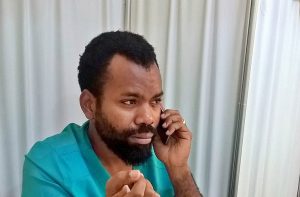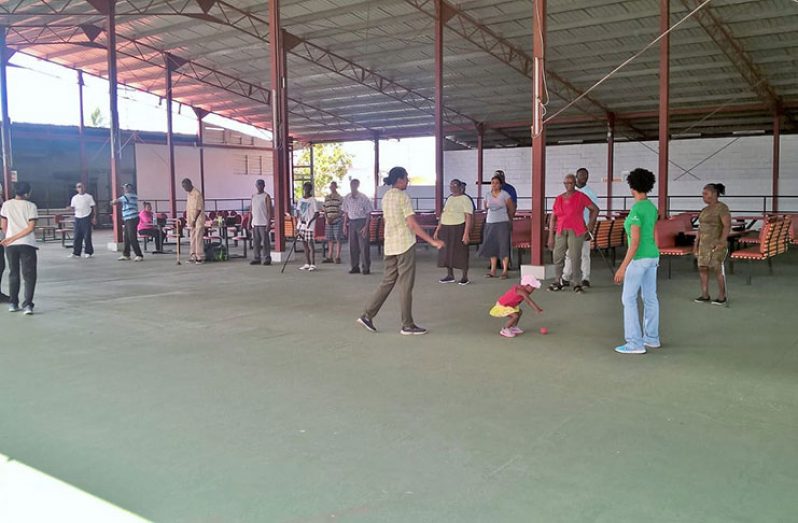ABUSE of the elderly has become much more of a problem than it was just a few years ago, and authorities are concerned that the general public, including caregivers, are not aware that what they’re doing to the elderly actually constitutes abuse.
While it is true that some elderly persons are being physically assaulted, abuse covers a number of other things, healthcare professionals have explained.

Three of them, from the Ministry of Health’s Rehabilitation Department, based in the Palms Geriatric Home on Brickdam, reached out to this publication in their bid to shed light on this heart wrenching issue that they feel ought to be dealt with immediately.
Director of the department, Barbara Butts-Lawrence, sat down a few weeks ago with her staff to discuss the general operations of their clinic, when the issue of elder abuse was raised by Dr. Victor Allen, who works along with patients at the Palms each week.
The patients would never come forward to relate their horror stories because they fear incurring the wrath of their relatives, and moreover, depend on these very persons to fill their every need in some cases. “Oftentimes, the person who cares for them is standing right here so they are unable to express themselves,” Lawrence said during an interview with the Pepperpot Magazine.
Another reason these persons hold back from opening up about their abuse is that they fear the overseers may get the police involved; and once this happens, it becomes harder on the patients in that their relatives become even more aggressive towards them.
But being trained in the medical field, and hence knowing what to look for in these patients, have helped the doctors gain a greater insight into the lives of these elderly persons who are being abused.
UNREALISTIC EXPECTATIONS
It has been found that some caregivers expect their loved ones to do certain things that they simply cannot do. Something seemingly simple as to lift a hand, or to visit the washroom alone, may be the hardest thing for an elderly person to do.
The caregivers oftentimes hastily conclude that the elderly person is either lazy or just not trying hard enough. “Some caregivers have unrealistic expectations and that’s where the abuse comes in, because they want them to walk or lift this hand and the patient just cannot do it,” Lawrence pointed out.

At times, the relatives or caregivers may force the elderly person to stand, reasoning that they are helping them to become independent sooner. “But that person may fall and hurt themselves. We see the black and blue marks on them and wonder why they are falling repeatedly, but we realise they are being forced to stand or go to the bathroom alone.”
Lawrence further informed that apart from the physical and psychological abuse being meted out to the elderly, there is also the financial aspect of the abuse. “A lot of these relatives focus on economics and a lot of them come just because they get the pension; that’s what brings them.”
While Lawrence and her team have even heard that the abuse can be sexual in nature due to the elderly being incapacitated, other reports have surfaced on how some relatives cause the death of the elderly person on purpose. “Sometimes they deliberately attempt to treat them in ways that would hasten their death,” she said.
Adding her bit as to what constitutes abuse, Physiotherapist Simone Seckle observed that it is sad that some relatives and caregivers do not know that the manner in which they’re treating their relative amounts to abuse. “They are thinking that they are pushing the relative to get better; they just want the person to become independent, but this may not always be easy on the patient because when the brain is damaged…because of age and the severity of the damage, you wouldn’t achieve that full independence.”
Because caregivers have their own lives to look after and may also be parents caring for young children, dealing with a sick elderly person can add severe burden to them, and that may be one reason they push them to gain independence sooner.
“Keeping an elderly person in pampers that are wet and soiled is elderly abuse; over medicating them because they want to sedate them is elderly abuse; under medicating them because they want to control their chronic diseases; pulling, tugging, tying them up, restricting them are all forms of abuse,” Seckle informed.
At times, relatives lock their elderly family members in a room when friends visit because they are embarrassed by them and, do not even want others to know that an elderly person is living with them.
Dr. Allen, who was also a part of the interview, related that two indications of an elderly person being abused are marks on their skin, and the attitude of the relatives towards the patient.
“When I studied in Cuba, we were trained to identify abuse and report it; to identify injuries of neglect and so forth in the geriatric population, and since I’ve started working in this department, I’ve seen some of it. It was shocking to know that the patient’s own children are abusing them verbally and physically, and in some cases, they tell us they even take away their pension.
“There are even cases reported where the children take the parents so that they can get their properties signed over and after that, it’s hell for those patients. They’re mistreated and placed in conditions to hasten their death.

“We were told that right here in the Palms, there are persons who don’t wish to be here, but they’re here. They have their properties and these were taken away from them and they are now left here for society to take care of them,” Dr. Allen related.
He pointed out that most of the patients he sees do not know how to behave in the presence of their caregivers. “When you go to them sometimes, they pull back as if they feel you were going to hit them, obviously an indication of what happens at home.”
WHAT CAN BE DONE?
Lawrence said the health officers at times feel that their hands are tied because they cannot get these elderly ones to speak out about what’s happening to them. Further, were they to involve the police and other authorities, it may just make the lives of these elderly ones worse.
She has been trying, though, to host a forum two times a year, specifically tailored to the needs of caregivers and relatives. The very next one to be held will include the issue of abuse, Lawrence said.
Dr. Allen said he wants to get more in depth into the laws governing the rights of these elderly persons, and is hoping that the government, through its various agencies, will continue to apply such laws in the interest of the victims.
“It’s saddening and makes me not want to get old,” Dr. Allen said.




.png)









